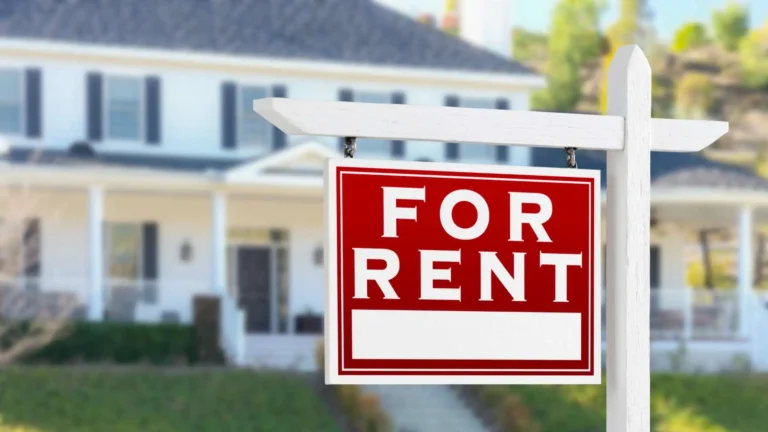Table of Contents
The Weight of a Phrase
Few phrases in personal finance are as enduring or damaging as “renting is just throwing money away.” For generations, families have repeated this as gospel, a justification for rushing into homeownership before they’re financially or emotionally ready.
In America, homeownership has been framed as a milestone and proof of success, responsibility, and stability. Renting, by contrast, is cast as failure, an admission that you’re paying someone else’s mortgage and walking away with nothing. But is that really true?
In 2025, the conversation looks very different. Families who rent smartly and invest the difference can come ahead of homeowners, weighed down by property taxes, repairs, and declining flexibility. It’s time to dismantle the old narrative. Renting is not always “throwing money away.” The truth is far more complex and empowering for renters willing to see their housing decisions through a wider lens.
Myth #1: “Rent Payments Build Nothing”
The most common critique of renting is that every check you write goes into your landlord’s pocket, never to be seen again. Homeowners, the argument goes, are at least paying toward something: building equity in a property that will one day be fully theirs.
The reality is that homeowners aren’t just “paying themselves.” They’re also paying interest on the loan, property taxes to the city, insurance premiums, and ongoing repair bills. In the early years of most mortgages, most payments go to interest, at first, and then to equity. A $2,500 monthly mortgage might only put $500 towapal at first. The rest? It’s gone forever, just like rent.
Renters may not be building home equity, but can build wealth in other ways. By investing the savings from skipped repairs, property taxes, and down payment costs into index funds, retirement accounts, or bonds, renters can grow assets that are just as valuable and often more liquid than a house. The difference lies in discipline, not destiny.
Read related blog: How to Negotiate Your Rent Like a Pro: Top 10 Tips
Myth #2: “Homeownership Always Beats Renting”
The math doesn’t always back this up. Consider two families:
- Family A buys a $400,000 home with 10% down. Their monthly costs (mortgage, insurance, property taxes, maintenance) total around $3,000. Over the next five years, they face a $12,000 roof repair and a $5,000 furnace replacement. If the home appreciates at 3% annually, they come out ahead, but their cash flow is perpetually tight.
- Family B rents a comparable home for $2,300/month. They avoid repair costs and taxes and invest their $7000 monthly savings. Over five years, their investments have grown significantly, creating wealth outside of housing.
The outcome depends on many variables: interest rates, appreciation, investment discipline, and personal stability. Ownership is not automatically superior; it’s simply one path among many.
Myth #3: “Renting Means You’re Not Ready for Adulthood”
Culturally, renting has been stigmatized as a “temporary” stage, something you grow out of when you become serious about life. But adulthood isn’t defined by a deed. It’s defined by stability, responsibility, and alignment with your financial goals.
A young couple who choose to rent while aggressively paying off student loans or saving for a larger down payment is acting responsibly. A family renting in a city for flexibility during career transitions is making a strategic choice. Retirees who sell their homes and rent to simplify their lives are not “failing”; they prioritize freedom.
The myth that adulthood requires ownership has left many families house-poor, tied to properties they can’t comfortably afford. In many cases, renting signifies maturity, recognizing your life stage and making choices accordingly.
Read related blog: Renting After Selling: A Smart Move Before Buying Again?
Myth #4: “Rent Increases Are Worse Than Mortgages”
Rents can indeed rise quickly, particularly in high-demand cities. But mortgages aren’t always the stable alternative they’re marketed as.
Homeowners face:
- Property taxes increase every year.
- Rising insurance costs, especially in climate-risk zones.
- Variable HOA fees or “special assessments” in condos.
- Repair surprises that can dwarf annual rent hikes.
Meanwhile, renters have mobility. If rents in one neighborhood spike, they can relocate. Homeowners cannot simply “move on” without selling, which takes time, money, and luck with the market. Flexibility is itself a form of financial security, something renters often undervalue.
Myth #5: “Renting is Only for People Who Can’t Afford to Buy”
This myth ignores choice. Many high-income families rent not because they can’t buy, but because renting better suits their lifestyle. Professionals on short-term contracts, retirees downsizing, or digital nomads all see renting as a way to preserve freedom while avoiding the long-term responsibility of ownership.
Even wealthy families sometimes prefer renting luxury apartments rather than buying, because they value mobility, concierge services, or the ability to pivot locations as careers or children’s schooling needs change. Renting isn’t always a fallback; often, it’s an intentional strategy.
Read related blog: Budgeting for Home Upkeep vs Renting with Maintenance Included
The True Cost of Homeownership vs. Renting
To fully debunk the “throwing money away” myth, it helps to put the numbers aside.
| Factor | Homeownership | Renting |
| Monthly Costs | Mortgage, taxes, insurance, maintenance (variable) | Rent + small insurance + utilities (predictable) |
| Equity | Builds gradually, mostly in later years | None directly; must invest savings separately |
| Flexibility | Low, selling is slow and costly | High, relocate with notice |
| Surprise Costs | Roofs, HVAC, repairs, rising taxes | Rare; usually only minor fixes |
| Liquidity | Wealth tied up in a house | Savings can stay liquid in investments |
| Stability | Long-term asset, but vulnerable to market shifts | Lease cycles, but freedom from repair risks |
The table shows that renting is not “wasteful.” It simply prioritizes flexibility and liquidity, while homeownership prioritizes long-term stability and equity.
When Renting Actually Wins
There are many situations where renting is the smarter choice:
- Short-term stays: If you’re moving in under five years, renting avoids costly transaction fees from buying/selling.
- Uncertain income: Freelancers, career changers, or families without a stable cash flow benefit from fixed rent over unpredictable ownership expenses.
- Hot markets: Buying may mean locking in at the top when home prices are peaking. Renting provides time to wait out the cycle.
- Lifestyle flexibility: For people who value travel, career mobility, or minimal responsibility, renting frees resources for experiences rather than upkeep.
Read related blog: 5 Health Insurance Myths You Should Stop Believing in 2025
When Buying WinOwnership
To be fair, ownership does deliver unmatched long-term benefits when done right:
- Equity growth and appreciation over decades.
- Stability for families who want to plant roots.
- Tax advantages in some cases (mortgage interest and property tax deductions).
- Freedom to renovate and control your living environment.
But these benefits only accrue if you’re financially prepared, willing to stay put, and able to weather the maintenance costs.
The Emotional Reframe: Renting as Freedom, Not Failure
Language matters. Calling rent “throwing money away” isn’t just inaccurate, it’s demoralizing. It makes renters feel lesser when, in fact, they’re often acting rationally. Rent can be reframed as paying for:
- Stability without risk.
- Freedom from maintenance headaches.
- Flexibility to move when life changes.
- The ability to invest elsewhere.
Rather than viewing rent as waste, think of it as payment for a service: housing without liability. As we don’t call groceries or car insurance “throwing money away,” rent is simply the cost of meeting a basic need.
Read related blog: The Top 10 Credit Score Myths You Need to Stop Believing in 2025
Renting as a Buffer During Economic Uncertainty
One overlooked strength of renting is how it cushions families during turbulent times. Economic downturns, layoffs, or industry shifts often force people to reevaluate their housing situation. For homeowners, selling under pressure can mean losses, foreclosure risks, or being stuck with an unsellable property in a declining market. Renters, however, retain flexibility.
They can downsize, relocate to lower-cost areas, or renegotiate leases. This agility allows renters to adapt without carrying the financial weight of illiquid assets in unstable economies. Far from being wasteful, rent can serve as a shield against volatility.
The Liquidity Advantage of Renting
Homeownership ties wealth into a single, illiquid asset: the house. Tapping into that equity often requires selling, refinancing, or taking on debt through a home equity loan. Renters, by contrast, can keep savings and investments liquid and diversified.
This liquidity provides freedom to seize opportunities, like investing in a new business, relocating for a dream job, or funding education, without waiting for the housing market to cooperate. In many cases, the ability to quickly access cash is worth more than slow-growing home equity.
Renting and the Hidden Value of Mobility
Modern careers are rarely linear. Job opportunities, promotions, or industry shifts often require moving to new cities or states. Renting allows families to pursue these opportunities without being held back by a property they can’t easily sell.
Homeowners tied to slow-selling homes may miss out on better-paying jobs or career advancement simply because their house keeps them geographically anchored. Seen this way, rent isn’t wasted money; it’s the price of staying agile in a dynamic job market.
How Renting Expands Lifestyle Options
Renting can unlock lifestyles that ownership often restricts. Families can live in city centers, near top schools, or near desirable amenities without the multi-million-dollar price tag of ownership in those areas.
A renter paying $3,000 for an apartment in a prime Manhattan neighborhood experiences the same lifestyle as a condo owner, paying millions without risks. Renting allows families to align housing with their lifestyle goals rather than their bank’s approval. For many, this freedom is the real wealth.
Renting as a Bridge to Smarter Ownership
For families who ultimately want to buy, renting is not a dead end; it’s a bridge. Renting provides time to build credit, save for a larger down payment, or wait for interest rates to cool.
By pausing in a rental rather than rushing into ownership, families can re-enter the market stronger, avoiding buyer’s remorse and financial strain. This deliberate approach often leads to better long-term outcomes than stretching prematurely into a mortgage to “stop wasting money on rent.”
Renting and Mental Health: The Underestimated Factor
Financial conversations often focus on numbers, but mental health matters just as much. For many, the stress of unexpected repairs, debt-laden mortgages, or constant upkeep can erode quality of life. Renters, on the other hand, outsource these headaches to landlords.
That mental relief is invaluable, knowing you won’t face a sudden $15,000 roof bill. Rent, in this sense, is not wasted; it’s a purchase of peace of mind and stability that doesn’t appear on a spreadsheet but profoundly impacts daily life.
How Beem Helps Renters Break the Stigma
Renters face unique financial challenges: sudden rent hikes, large deposits, or moving costs that can disrupt even the best budgets. Beem’s Everdraft™ provides up to $1,000 interest-free with no credit checks or due dates, giving renters breathing room.
With Beem’s budgeting tools and range of financial services and features, renters can transform the old narrative, showing that renting is not a weakness but a choice that can coexist with strong financial planning and solid backing. Download the app now!
The Bottom Line: Rent Isn’t Waste, It’s Strategy
The myth of “throwing money away” on rent is rooted in outdated assumptions. In 2025, the choice between renting and buying is more nuanced than ever. Renting can be a stepping stone, a long-term strategy, or even a permanent solution depending on your goals. What matters is not whether you rent or buy, but whether you use your resources wisely, investing, saving, and planning for the future.
Homeownership can build wealth, but it also brings risk and responsibility. Renting may not build equity, but it offers flexibility, liquidity, and peace of mind. Both paths can work if chosen with intention.
FAQs on Debunking Myths About ‘Throwing Money Away’ on Rent
Is renting always cheaper than buying?
Not always. In some markets, rents rival or even exceed monthly mortgage payments. But renting still avoids taxes, repairs, and hidden costs, making it more predictable and manageable.
Can renters build wealth without owning property?
Yes. Renters can grow wealth through retirement accounts, stock markets, or other investments by consistently investing the money they save by not paying for upkeep, taxes, and repairs.
Why does everyone say rent is “throwing money away”?
Rent doesn’t build equity in a property, but the phrase oversimplifies reality. All housing costs money; owning shifts those costs into equity, taxes, and repairs instead of rent.
How do I know if I should rent or buy?
Ask yourself: Do I plan to stay at least 5–7 years? Do I have savings for emergencies? Am I comfortable with ongoing upkeep costs? If not, renting is likely the better option for now.
How does Beem help renters?
Beem provides financial tools and instant cash cushions to handle unexpected rent hikes, deposits, or moving costs. That stability makes renting safer and smarter for families who want flexibility without losing financial ground.














































